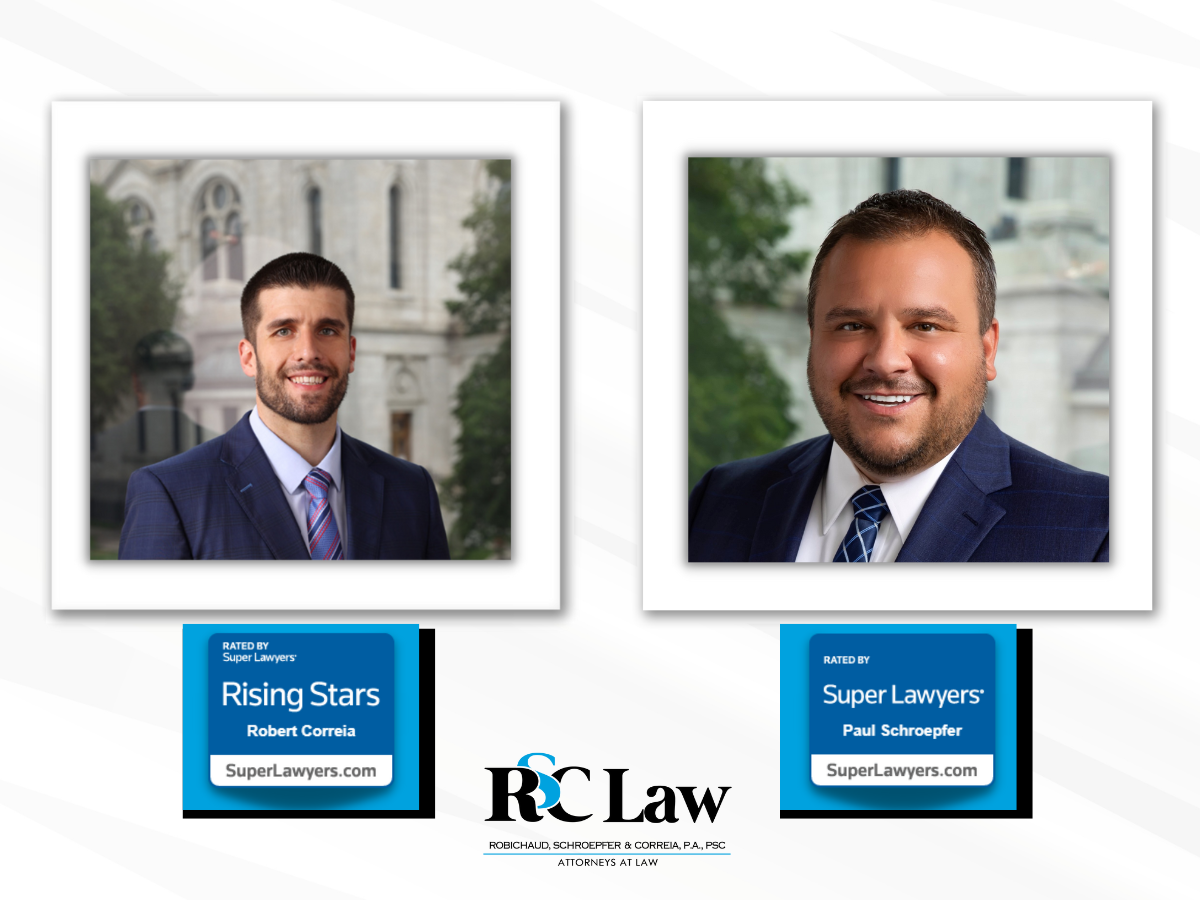Workers’ Compensation
At RSC Law, we help employees injured on the job navigate the workers’ compensation system to seek fair and just compensation.

Comprehensive Workers’ Compensation Representation in Minneapolis, Minnesota
In a bustling city like Minneapolis, workplace injuries can occur when you least expect them. Whether it’s due to a sudden accident or cumulative stress from repeated tasks, every employee needs to understand and protect their rights when it comes to workers’ compensation. At RSC Law, our workers’ compensation attorneys recognize the importance of proper legal support in such challenging times.
Our dedicated team focuses on providing comprehensive representation for workers’ comp cases in and around Minneapolis. We understand the complexities of dealing with insurance companies, and we believe that you should be able to focus on your recovery and return to work while we handle the legal intricacies.
With our experience, knowledge, and commitment to advocating for your rights, we strive to ensure that you are seeking the appropriate compensation and support you need for your recovery. Contact us today to request a free consultation, during which we will review the details of your unique case. Let us navigate the legal process for you, allowing you to prioritize your well-being and peace of mind.
Minneapolis Workers’ Compensation and Work Injury Case Types
Our lawyers practice all types of work injury, including:
- Traumatic Injuries
- Repetitive Stress Injuries
- Deadly Accidents
- Work-Related Car Accidents
- Assembly Line Accidents
- Construction Site Accidents
- Pre-Existing Conditions
- Back & Neck Injuries
- Job Loss after a Work Injury
- Gillette Injury
- Slip and Fall Injuries
- Proving a Workplace Injury
- Employee vs. Independent Contractor
- PTSD
It does not matter if the injury is your fault. You are fully protected under the law. Even if your employer considers you an independent contractor, you may in fact be covered by workers’ compensation insurance. An experienced attorney will help resolve this issue. You should not be afraid of losing your job or being punished for reporting an injury. Don’t wonder whether you have a claim or what your rights are. Don’t worry about how to pay your medical bills. If you were injured on the job, call us at (612) 333-3343 right now or fill out our online form. We can help.
Common Types of Workplace Injuries in Minnesota
Workplace injuries in Minnesota can encompass a wide range of scenarios, each with its own set of challenges and implications. Understanding these common types of injuries is crucial for both employees and employers to prioritize safety and well-being in the workplace.
- Slips, Trips, and Falls: Accidents involving slips, trips, and falls are prevalent workplace injuries in Minnesota. These incidents can occur due to wet floors, uneven surfaces, or debris in walkways, often leading to suffer harms ranging from sprains or fractures to neck, head, back, or hip injuries. Traumatic brain injury (TBI) or Spinal cord injury (SCI) are not unheard of in slip-in-fall work accidents.
- Repetitive Strain Injuries: Repetitive strain injuries, such as carpal tunnel syndrome and tendonitis, are common among workers who perform repetitive motions or tasks. These injuries can develop over time and lead to chronic pain and restricted mobility.
- Machinery Accidents: Employees in industrial and manufacturing settings are at risk of machinery-related accidents, which can lead to severe injuries such as amputations, lacerations, and crush injuries. Proper training and safety protocols are essential for preventing these incidents.
- Strains and Overexertion: Overexertion from lifting, pushing, or carrying heavy objects can lead to strains and muscle injuries. These injuries are often preventable through proper training and ergonomic workplace design.
These common workplace injuries highlight the importance of prioritizing safety measures and legal protection for employees across various industries in Minnesota.
What Is Workers’ Compensation Insurance?
Employers in the state are legally required to carry workers’ comp insurance, which covers work-related accidents, injuries, and occupational diseases. Workers’ compensation coverage encompasses medical expenses, partial wage replacement, and rehabilitation for employees affected by workplace incidents. The system operates on a no-fault basis, aiming to support employees and alleviate the financial burden associated with workplace injuries.
Understanding a Workers’ Compensation Claim
Minnesota Statute §176 addresses a workers’ comp claim, allowing the payment of workers’ compensation benefits for an illness or injury sustained from job-related activities in the scope of employment. Payable in various ways, these benefits are part of workers’ compensation insurance, which plays a vital role in both the well-being of employees and the financial security of businesses. Minnesota employers secure this type of insurance through open competition, which enables workers’ compensation insurance companies to set rates and compete for business.
An injured worker in Minnesota can seek the following workers’ compensation benefits:
Wage Loss
In Minnesota, the workers’ compensation system provides wage loss benefits to employees who suffer a decrease in income due to a work-related injury or illness. These wage loss benefits strive to partially compensate workers for their lost earnings due to the inability to work at full capacity or return to the same pre-injury job.
The three types of wage loss benefits include:
- Temporary partial disability (TPD) benefits — paid when an employee earns a lower weekly wage than they did at the time of the injury, whether they return to their original employer or a new employer. Tax-free TPD benefits are two-thirds of the difference between your average weekly wage at the time of the injury and your current weekly earnings. For injuries sustained on or after October 1, 2018, you typically cannot be paid more than 275 weeks of TPD benefits or be paid such benefits after 450 weeks have passed since the date of injury. These limits may not apply if you are participating in a work retraining education program.
- Temporary total disability (TTD) benefits — available when an employee is unable to work at all due to the injury. On the first day you cannot work, even if it’s not a full day, the law considers you disabled. Following a three-day waiting period, TTD starts on the fourth day. If you still cannot work after the tenth day, wage-loss benefits are also paid for the waiting period. The insurer must start paying TTD within 14 days of your employer learning about your inability to work. TTD benefits equal two-thirds of your average weekly wage at the time of your injury (subject to maximum and minimum limits). Generally, you cannot be paid more than 130 weeks of TTD benefits; however, if you’re enrolled in an approved work retraining education program, your benefits may be paid longer. Tax-free TTD benefits follow the same pay schedule you had before your injury.
- Permanent total disability (PTD) benefits — provided to employees who are permanently unable to return to any form of gainful employment due to their work-related injury. Distributed on a tax-free basis, the PTD benefit is two-thirds the gross weekly wage you were earning when you were hurt on the job. The law in effect on the date of the incident determines the amount of these benefits. Specific minimum and maximum amounts apply.
This comprehensive coverage of wage loss benefits under Minnesota workers’ comp law serves to support and protect injured employees during their recovery process.
Medical
In Minnesota, injured workers have the right to reasonable and necessary medical treatment or supplies to cure or relieve the effects of a work-related injury or illness under the state’s workers’ compensation law. This includes coverage for medical expenses related to the injury, such as doctor visits, hospital stays, surgery, medication, physical therapy, and other medically necessary treatments.
The workers’ compensation system is designed to provide comprehensive medical benefits to ensure that injured workers can access the care they need to recover from their work-related injuries. Additionally, the no-fault insurance system in Minnesota aims to pay for medical expenses due to workplace incidents, thereby supporting injured employees without the need to establish fault.
Payment for Permanent Damage to a Body Function
Workers’ compensation may include payment for permanent damage to a body function. This form of compensation is designed to provide financial support for any permanent impairment due to the work-related injury.
Mileage Reimbursement
Injured workers may also be eligible for mileage reimbursement for medical appointments related to their work-related injury. This reimbursement covers the cost of traveling to and from medical facilities for necessary treatments and appointments.
Vocational Rehabilitation
Per Minnesota Statutes 176.102, which seek to restore the injured worker to a role linked to their previous employment and work environment, vocational rehabilitation benefits are provided to injured workers.
The assistance of a Qualified Rehabilitation Consultant (QRC) may be offered to injured workers. The QRC’s responsibilities generally include:
- Providing medical management
- Facilitating the return to work
- Assisting with job placement
Vocational rehabilitation benefits assist injured workers in overcoming the challenges associated with returning to their former occupation, thereby protecting their earning power after a work-related injury. These benefits encompass various forms of support, including job search assistance, tuition, training, counseling, and case management.
Can My Employer Stop Wage-Loss Benefits for Job-Related Injuries?
If your employer or insurer believes you should not be paid wage-loss benefits anymore, the insurer must provide you with a Notice of Intention to Discontinue Workers’ Compensation Benefits (NOID) form stating why and when benefits will discontinue.
Benefits for lost wages can be stopped for several reasons, including:
- You have been paid the maximum number of weeks for lost income
- You have returned to work and are no longer losing any money
- 90 days have passed since medical experts told you that you have reached maximum medical improvement or MMI — which means you have healed as much as you can possibly heal, even if you still have pain or symptoms
- You can work without any restrictions from your injury, or are able to return to work and either are not looking for work or refuse work within your restrictions
You can challenge the insurer’s decision by requesting a conference with a workers’ compensation judge, who will determine if the insurer was right to stop your wage-loss benefits. If you are sent a NOID form with which you disagree, you must request a conference within 12 days or face a longer objection procedure. Usually, wage-loss benefits must be paid until the date of the conference.
What Is Permanent Partial Disability (PPD)?
If a workplace injury leads to the permanent loss of use of functional impairment, workers could be eligible for PPD. According to the Minnesota Workers Compensation Permanent Partial Disability Schedule, the physician providing your medical care rates your degree of permanent partial disability — generally one year after the workplace injury.
PPD benefits compensate workers for the permanent loss of use of a body part. The amount of money to be paid is based on a PPD rating determined by your doctor, multiplied by a specific dollar amount to establish the payable benefit. You can find disability schedules in Minnesota Rules Chapter 5223 and Minnesota Statutes section 176.101, subdivision 2a.
Are Survivor Benefits Available to the Families of Individuals Who Suffer Fatal Job-Related Injuries?
Per Minnesota Statute Section 176.111, the spouse, children and other dependents of a worker who dies directly due to a work-related accident or occupational illness could potentially be eligible for dependency benefits for a specified period. Workers’ compensation insurance also pays burial expenses; for dates of injury on or after April 28, 2000, the maximum amount is $15,000. The payment for these injuries on or after April 28, 2000 is made to the estate if the deceased has no dependents.
What to Do Immediately Following A Job-Related Injury
If you suffer a job-related injury, you will need to address the following:
- Tell your employer about your job-related injury as soon as you possibly can. You could lose your right to workers’ comp benefits if you fail to report the injury within specific timeframes.
- Your employer must complete a First Report of Injury form and submit it to the employer’s insurance company within 10 days of learning about your injury and missed work time.
- After you report your injury to your employer, their workers’ comp insurer will investigate your claim to determine if it’s work-related and eligible for workers’ compensation coverage.
- Inform your employer about your medical care and any work restrictions.
- Alert your employer’s insurer if your ability to work has changed. You should also inform your employer and their insurer if you have returned to work.
Do I Need a Workers’ Comp Lawyer?
Dealing with workers’ compensation claims following a job-related injury can add more stress during a time when you’re already dealing with physical pain, financial uncertainty, and concern about your future.
Hiring a knowledgeable workers’ compensation lawyer is a wise decision for many reasons.
- Complexity of Cases: Every workers’ compensation case is unique, and navigating the legal process can be daunting. A skilled workers’ comp lawyer can provide valuable guidance tailored to the specific details of your case and help you understand your rights and legal options.
- Protection from Your Employer and Your Employer’s Insurance Company: Workers’ compensation lawyers can serve as advocates for harmed workers, representing their interests in dealings with employers and insurance companies.
- Maximizing Benefits: Experienced workers’ comp attorneys can help harmed workers navigate the complexities of workers’ compensation claims, potentially maximizing the benefits they can seek. An attorney’s knowledge and experience with workers’ compensation cases can be instrumental in securing fair compensation and support for the worker.
- Legal Advice and Representation: Consulting an experienced workers’ compensation lawyer can provide you access to legal advice and representation, which is pivotal when dealing with intricate legal matters related to workplace injuries.
- Pursuing Fair Compensation: Legal representation can assist you in pursuing fair and just compensation for a work-related injury or illness, which can encompass various types of benefits — including wage loss benefits, medical treatment coverage, and vocational rehabilitation support.
Seeking a Workers’ Compensation Attorney Who Knows How to File Workers’ Compensation Claims? Contact Robichaud, Schroepfer and Correia, P.A. Today
Illnesses or injuries suffered on the job can take a toll on you mentally, physically, and emotionally as you seek compensation to cover current and future medical expenses. You may also worry about the impact on your family and their quality of life. With four decades of combined experience, the attorneys and legal professionals at RSC Law are prepared to guide you through your workers’ comp claim, drawing upon our profound knowledge of Minnesota law and our extensive experience assisting clients through a successful claims process.
If you’re wondering, “how much does a workers’ comp lawyer cost?” rest assured, you won’t pay us a dime until we secure a fair settlement amount. Schedule a free consultation today at (612) 333-3343 or by completing our online form. We will assess the details of your unique case and build a legal strategy to help you seek fair and just compensation.
We’re here to help
Contact Us Today
For A Free Consultation
Call Now (612) 333-3343
Free consultations are available for personal injury and workers’ compensation cases. For the convenience of our clients, we speak Spanish, Vietnamese, and Somali.
We respect your privacy. The information you provide will be used to answer your question or to schedule an appointment if requested.
Why Choose Robichaud, Schroepfer and Correia, P.A.?
We have offices in Minneapolis, MN, and Louisville, KY, catering to all walks of life. Our clients place trust and confidence in our well-established law firm because we always put our clients first:
- A proven track record both inside and outside the courtroom.
- Clients are the boss. You’ll know the strategy and options. We guide and you decide.
- You will know we are fighting for you based on an understood game plan.
- You are not just a file number; we provide the individualized attention you deserve.
- We accommodate clients from all cultures in a variety of languages.
- We provide the strengths and benefits of a big law firm combined with the small-firm care and accessibility you deserve.
- We guide you in your case from start to finish to achieve the best outcome possible.
Our actions speak for us; contact us today to schedule a free consultation.
News & Resources

RSC Law Announces the Hiring of an Experienced Immigration Attorney
MINNEAPOLIS, Minnesota—RSC Law proudly announces the hiring of Associate Attorney Evangeline Dhawan-Maloney. Evangeline brings a…

RSC Law Announces Super Lawyers Selections for Two Attorneys
MINNEAPOLIS, Minnesota—RSC Law proudly announces that attorneys Paul Schroepfer and Robert Correia have been selected…

Personal Injury Attorney Robert A. Correia Named Attorney of the Year
MINNEAPOLIS, Minnesota—Robert A. Correia, Shareholder and Lead Attorney of Robichaud, Schroepfer & Correia, P.A., has…



